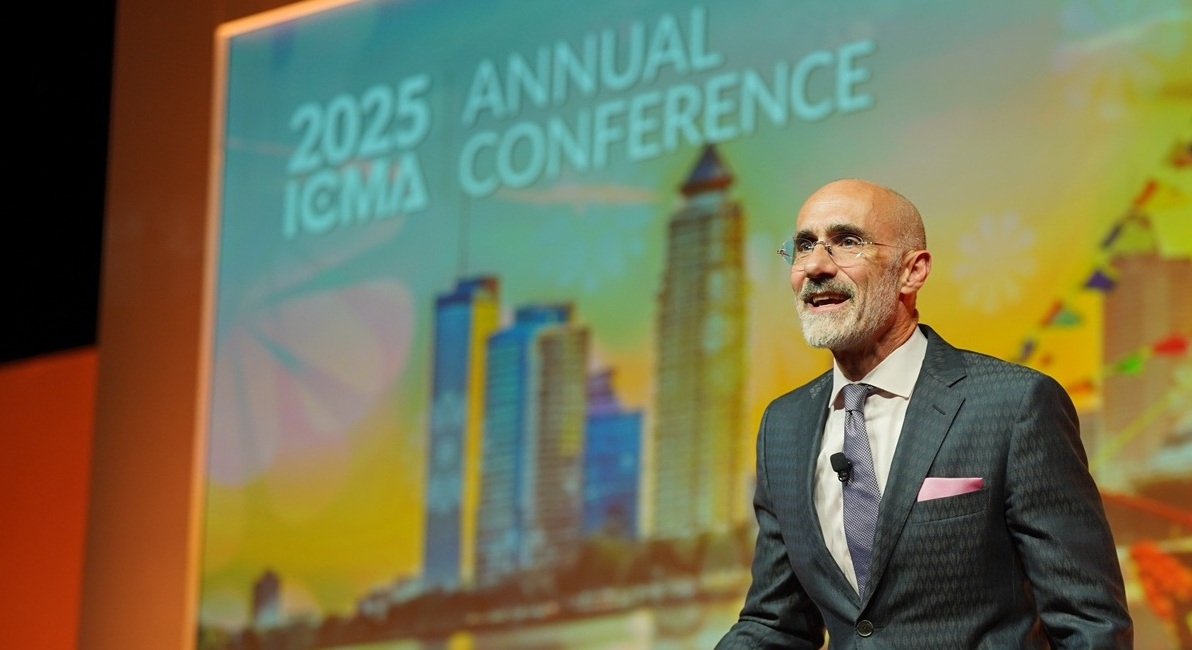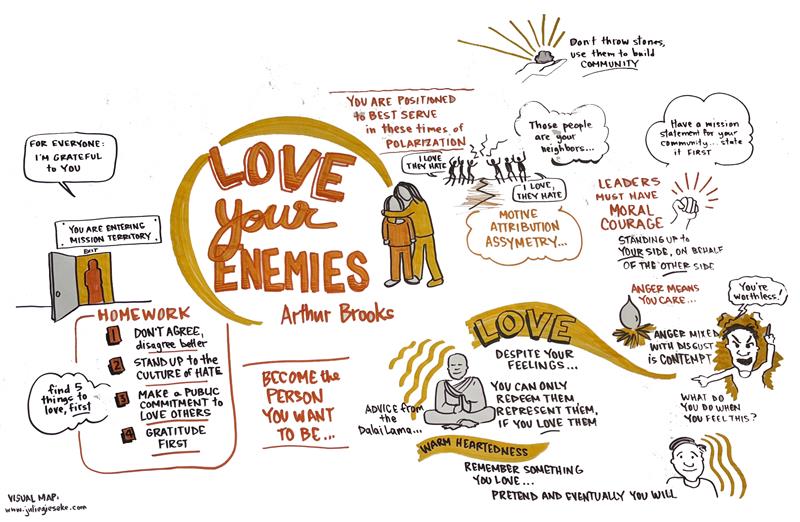
At the opening general session of the conference, sponsored by MissionSquare, Harvard professor and best-selling author Arthur C. Brooks took the stage with a simple but profound statement: “America doesn’t have an anger problem—it has a contempt problem.”
That one line set the tone for the next 40 minutes. Brooks, a Harvard professor and best-selling author of Love Your Enemies, has spent years studying what drives human happiness and connection. In his address, he urged local government leaders—the very people who bridge communities every day—to take the lead in curing what he calls the nation’s culture of contempt. He proposed ways that local government can help Americans stop tearing each other apart and start finding joy again.
The Outrage Industry
Too often, Brooks said, people don’t just disagree anymore—they view those on the other side as stupid, evil, or worthless. This isn’t accidental. He described how politics, media, and social platforms have turned outrage into a profitable industry.
“It’s increasingly common for people to view those who disagree with them not as misguided or incorrect, but as evil or beneath them.” He cited a psychological concept called motive attribution asymmetry—a phenomenon in which two opposing groups each believe they are motivated by love, while the other side is motivated by hate.
Researchers have measured this dynamic in conflict zones like Israel-Palestine and Rwanda. “And they found the same level,” Brooks said, “between Democrats and Republicans in the United States as they did in those conflicts. That was back in 2014—before things got worse.”
“You can’t simultaneously love and hate your country—or your spouse, or your neighbor,” he said. “But that’s what we’ve come to believe about each other.” Local government professionals know that better than anyone, having to deal with that divide up close, every day, in council meetings, community events, and Facebook comment sections.
Contempt, he explained, is more corrosive than anger. Anger can mean you still care; contempt means you’ve written someone off entirely. “It’s like emotional eye-rolling,” Brooks said, noting that in relationships, contempt is the single biggest predictor of divorce. The same dynamic, he argued, now poisons America’s civic life.

The Science of Love and Happiness
Over and over, Brooks emphasized the importance of love and connection. Love, he said, is not a feeling—it’s a choice. Drawing from the teachings of Dr. Martin Luther King Jr., Brooks reminded the audience that love means “willing the good of the other,” even when it’s hard.
“You don’t have to like your enemies,” he said, “but you do have to love them.” That distinction matters, especially for leaders who have to serve everyone. You can’t pick your residents, but you can decide to love them.”
When Brooks asked the Dalai Lama what to do when he feels contempt, the spiritual leader advised, “Choose to show warm-heartedness.” That, Brooks said, is not about pretending to agree—it’s about deciding to act with compassion, even when you don’t feel it. “You’ll start to feel it after you do it,” he added. “That’s how the human heart works.”
Local Government: The Frontline of Hope
Despite the grim diagnosis, Brooks’s tone was anything but pessimistic. “People tell me Washington is broken,” he said, “but I tell them, get out more. There’s so much good happening in cities and towns all across America. You’re proving every day that government can work.”
But the job of governing people who can’t stand each other isn't easy. “You’re serving residents who don’t get along with each other,” he said. “And maybe even some you don’t get along with. So how can you do it better?”
Four Assignments for Leaders
Ever the college professor, Brooks offered the audience four “assignments” for practicing these principles in their leadership and their lives.
1. Don’t agree—disagree better.
“Agreement is overrated,” he said. “The goal isn’t to disagree less, but to disagree better.” Healthy disagreement, he argued, is the engine of progress. “If you’re grateful we don’t live in a one-party state, then you’re grateful for the people who disagree with you,” he said. “They make democracy work.”
2. Resist the outrage machine.
Brooks challenged attendees to identify the people and platforms that profit from their anger. “They’re monetizing your fear and your sense of superiority. Don’t give them that power.”
3. Publicly commit to love.
He encouraged leaders to say it out loud: “I will not treat anyone with contempt.” Post it on social media, he said, and let people hold you to it. He even suggested a technique borrowed from marriage research: before criticizing someone, name five good things about them first. “By the time you get to the criticism, you’ve become a different person,” he said
4. Cultivate gratitude.
Of all the antidotes to contempt, Brooks said, gratitude may be the most powerful. He told the story of magician Howard Thurston, who began every performance by silently thanking his audience for allowing him to do what he loved. “That gratitude made him great,” Brooks said. “When was the last time you said, ‘I love my residents’? That feeling makes contempt impossible.”
Mission Territory
As he closed, Brooks left the crowd with an image. He described a church he once visited in Alabama that had unusual signs above the exit doors. Instead of reading “Exit,” they said, You are now entering mission territory.
“I want you to imagine those signs above the doors here,” Brooks told the audience. “Because when you go home—back to your communities, your organizations, your residents—that’s mission territory. That’s where you’re called to serve.”
In the end, Brooks’s message wasn’t about politics or partisanship; it was about humanity. He told attendees that each one of them has the power to heal the divisions in their communities.
“You can’t choose your residents,” he said. “But you can choose to love them. And if you do, you’ll not only serve them better—you’ll help heal this country.”
Watch ICMA TV to see more from the 2025 ICMA Annual Conference!
New, Reduced Membership Dues
A new, reduced dues rate is available for CAOs/ACAOs, along with additional discounts for those in smaller communities, has been implemented. Learn more and be sure to join or renew today!
